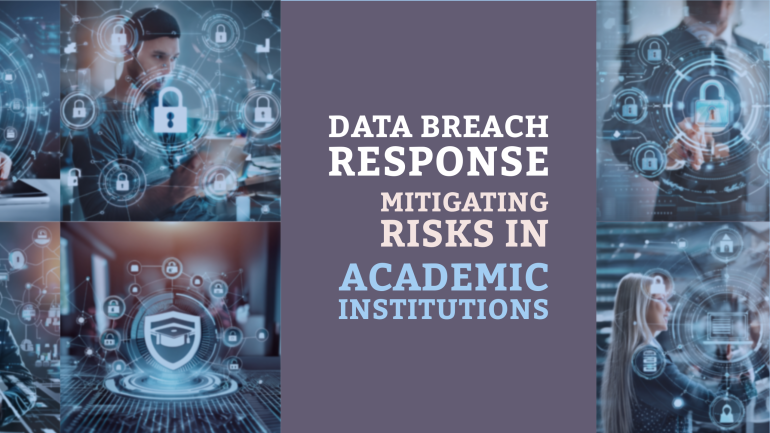Table of Contents
You may also interested:
TL;DR: A Guide to Data Protection Legislation for Universities
- Data Protection Legislation for Universities: Universities must comply with data protection laws to safeguard personal information.
- Legal Obligations: Universities have legal obligations to protect and process data lawfully, fairly, and transparently.
- Data Subject Rights: Data subjects have rights, including access to their data, rectification, erasure, and the right to object to processing.
- Security Measures: Universities should implement adequate security measures to protect the confidentiality, integrity, and availability of personal data.
- Compliance and Training: Regular training and compliance assessments are important to ensure that universities adhere to data protection legislation and best practices.
Legislation concerning data protection is crucial for universities to ensure the security and privacy of their students, staff, and research. With the increasing reliance on digital platforms for academic and administrative purposes, understanding and following data protection laws is paramount to avoid severe penalties for non-compliance. This guide aims to provide universities with necessary information regarding data protection regulations to help them safeguard sensitive information and maintain trust within their academic community.
Understanding Data Protection Laws
General Data Protection Regulation (GDPR)
Even for universities outside of the European Union, it is crucial to understand the General Data Protection Regulation (GDPR). This regulation, implemented in May 2018, aims to protect the personal data of EU citizens. It imposes strict rules on how organizations handle and process personal data, with severe penalties for non-compliance.
The Family Educational Rights and Privacy Act (FERPA)
The Family Educational Rights and Privacy Act (FERPA) is a US federal law that protects the privacy of student education records. It gives parents certain rights with respect to their children’s educational records, including the right to access and request amendments to the record. Universities must comply with FERPA regulations to ensure the confidentiality of student information.
FERPA is a critical legislation in safeguarding student privacy, ensuring that educational institutions handle sensitive information responsibly. Violating FERPA can lead to the loss of federal funding and damage to the institution’s reputation. It is vital for universities to establish robust policies and procedures to adhere to FERPA guidelines.
Implementing Data Protection Strategies
Data Protection Officers in Universities
Officers in universities play a crucial role in ensuring compliance with data protection laws. They are responsible for overseeing data protection strategies, conducting risk assessments, and implementing necessary measures to safeguard sensitive information. Data Protection Officers should have a strong understanding of data protection legislation and act as a point of contact for staff, students, and regulatory authorities.
Training and Awareness for Staff and Students
With the increasing number of data breaches in educational institutions, training and awareness programs are crucial. Universities should provide regular training sessions to educate staff and students about data protection policies, procedures, and best practices. This can help prevent accidental data leaks, phishing attacks, and unauthorized access to sensitive information.
This proactive approach can significantly reduce the risk of data breaches and ensure compliance with data protection laws. Regular training can empower staff and students to handle data securely and mitigate potential risks. Increasing awareness about data protection can create a culture of responsibility and accountability within the university community. By investing in training and awareness initiatives, universities can strengthen their data protection strategies and protect the confidentiality and integrity of personal information.
Responding to Data Breaches
Mitigation Strategies
The key to responding to data breaches in a university setting is to swiftly implement mitigation strategies. The first step is to contain the breach by identifying the source and extent of the incident. This may involve isolating affected systems, changing login credentials, and deploying patches to security vulnerabilities. Communicating transparently with stakeholders is crucial to maintain trust and limit the impact of the breach.
Legal Obligations and Notifications
An vital aspect of responding to data breaches is understanding your legal obligations and notification requirements. Universities must comply with data protection legislation such as the General Data Protection Regulation (GDPR) and the Family Educational Rights and Privacy Act (FERPA). Failure to adhere to these regulations can result in hefty fines and damage to the institution’s reputation.
Notifications about data breaches must be made promptly to the relevant supervisory authority and affected individuals. Timely and accurate communication is vital to demonstrate compliance with data protection laws and to mitigate the potential harm caused by the breach. It is crucial to provide details about the nature of the breach, the data compromised, and the steps being taken to address the incident.
International Data Transfers and Compliance
Transfer of Student and Staff Information Overseas
For universities handling international data transfers, especially student and staff information, it is crucial to ensure compliance with data protection legislation. Any transfer of personal data overseas must adhere to strict guidelines to safeguard the privacy and security of this information.
Collaborating with International Partners
An vital aspect of a university’s operations is collaborating with international partners, which often involves sharing sensitive data. Any collaboration must be approached with caution to ensure compliance with data protection laws and regulations.
Partnerships with international institutions can bring valuable opportunities for research and academic exchange. However, it is imperative to establish clear agreements regarding data protection measures and ensure that all partners adhere to the same standards of security and compliance to mitigate any potential risks.
Conclusion
With these considerations in mind, universities must prioritize compliance with data protection legislation to safeguard sensitive information and maintain trust with students, staff, and other stakeholders. By implementing robust data protection policies, conducting regular risk assessments, and providing comprehensive training, universities can navigate the complex landscape of privacy regulations effectively. It is crucial for institutions to stay informed and adapt to evolving data protection laws to mitigate privacy risks and foster a culture of transparency and accountability in handling personal data.
FAQ
Q: What is the importance of data protection legislation for universities?
A: Data protection legislation for universities is crucial to ensure the security and privacy of students, faculty, and staff personal information. It helps to prevent data breaches and unauthorized access to sensitive data.
Q: What are the key data protection laws that universities need to comply with?
A: Universities need to comply with laws such as the General Data Protection Regulation (GDPR) and the Family Educational Rights and Privacy Act (FERPA) to safeguard the personal data of individuals.
Q: How can universities ensure compliance with data protection legislation?
A: Universities can ensure compliance by implementing data protection policies and procedures, conducting regular training for staff, appointing a data protection officer, and conducting audits to assess data handling practices.
What are the consequences of non-compliance with data protection legislation?
A: Non-compliance with data protection legislation can result in hefty fines, reputational damage, and loss of trust among students, faculty, and stakeholders. Universities may also face legal action for mishandling personal data.
Q: How can universities create a culture of data protection awareness?
A: Universities can create a culture of data protection awareness by promoting best practices, providing resources for staff and students to understand data protection principles, and fostering a proactive approach to data security within the institution.




